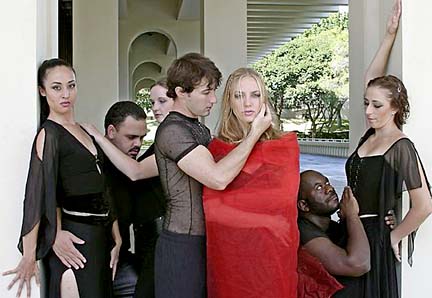
PHOTO COURTESY JEREMY PIPPIN
From left, "Agamemnon" features students Annie Lipscomb, Alto Steele, Allyson Paris, Terry Allen, Elizabeth Grote, Omar Williams and Ashley Larson.
‘Agamemnon’ fails
to stir emotions
The desire for revenge is an ever-popular premise for fiction in many cultures, but the dark and grim production of "Agamemnon" that continues this weekend at the University of Hawaii-Manoa Ernst Lab Theatre often feels distant and never fully engages the audience in the characters' lives.
'Agamemnon'
Repeats at the University of Hawaii-Manoa Ernst Lab Theatre 11 p.m. today and tomorrow.Tickets: $8; $7 for seniors, military, UH faculty and staff and non-UH students; $3 UH students with valid 2003 ID. Call 956-7655.
In part this is because director Cassandra Wormser uses Steven Berkoff's modern adaptation of Aeschylus' classic tale of vengeance and betrayal without making any allowances for folks who don't already know the story's context.
Three key actors give strong performances even if it isn't always clear what's happening. Aito Steele, last seen as Falstaff in this year's Hawaii Shakespeare Festival, gives an equally energetic performance in the title role. Annie Lokomaika'i Lipscomb is a strong second as Agamemnon's devious wife, Clytemnestra, and D. Omar Williams emerges as a powerful and aggressive Aegisthus.
Another interesting element is guest choreographer Norman Munoz's use of movement that is apparently inspired by hula kahiko rather than Western dance. In an early sequence, a row of seated diners tap their utensils in unison as if performing a seated hula. The ensemble's choreographed use of staves as weapons and rhythm instruments is also reminiscent of hula kahiko.
These hints of kahiko catch the eye and give Wormser's "Agamemnon" a distinctive ambience while avoiding the impression of being an academic exercise in contrived cross-culturalism.
Stark black costumes, and simple but imaginative lighting effects by Jennifer Bolieu, enhance the actors' performances as Aeschylus' tale of vengeance and death plays out.
THE PROBLEMATIC aspects are elsewhere. The use of a chorus to provide narration and commentary is a quintessential part of ancient Greek theater, but much of the individual dialogue comes across as theatrical recitation. Aeschylus' story is rife with torment and soaked with blood, and the recitation conveys little sense of it.
Narrative passages reveal that Agamemnon, king of Argos, sacrifices his virgin daughter to the gods so that the Greeks might continue their journey to Troy after being blocked by some combination of bad weather or divine intervention. The hapless girl was stripped naked, and her throat was slashed so that her blood spattered into the sea.
The girl's sacrifice was necessary as a matter of state. The Greeks had sworn vengeance on Troy after Paris, prince of Troy, betrayed Agamemnon's brother, Menelaus, king of Sparta, by seducing and making off with Menelaus' wife, Helen, said to be the most beautiful and desirable woman in the world.
The "matter of state" explanation didn't sit well with Agamemnon's wife, Clytemnestra, who, as the play begins, has had 10 years to brood about her daughter's brutal demise. As if that's not reason enough for Clytemnestra to turn against her husband, Agamemnon returns with the Trojan king's daughter, Cassandra, as his comfort woman.
Clytemnestra continues to play the role of queen and loving wife perfectly -- until she murders him in his tub.
Wormser suggests in program notes that there is a parallel between America's choice of targets in the continuing war on terrorism and the ancient Greek states' decision to destroy Troy and send men to their deaths "all for the sake of one young girl" after Paris made off with Helen. And yet, as political commentators never tire of pointing out, there are times when violence must be employed as a solution to the problems caused by apostles of racial and religious arrogance.
Wormser's "Agamemnon" would be more accessible if the playbill contained dramaturge's notes explaining that the gods' demand for the girl's sacrifice may have been made to punish Agamemnon for something he had done prior to the Greeks' departure for Athens. It would also help to know that Clytemnestra and Aegisthus had become lovers during Agamemnon's absence and that Aegisthus hoped to take the throne for himself.
Even the nature of Paris' betrayal of Menelaus, and the gods' previous involvement in Paris' desire for Helen, goes unmentioned. Given that additional information, the Greeks' decision to expend so much blood might make more sense.
As it is, this "Agamemnon" gives little reason to care about the characters and -- with the possible exception of Steele's energetic yet introspective Agamemnon -- little reason to care about what becomes of them.
Click for online
calendars and events.

